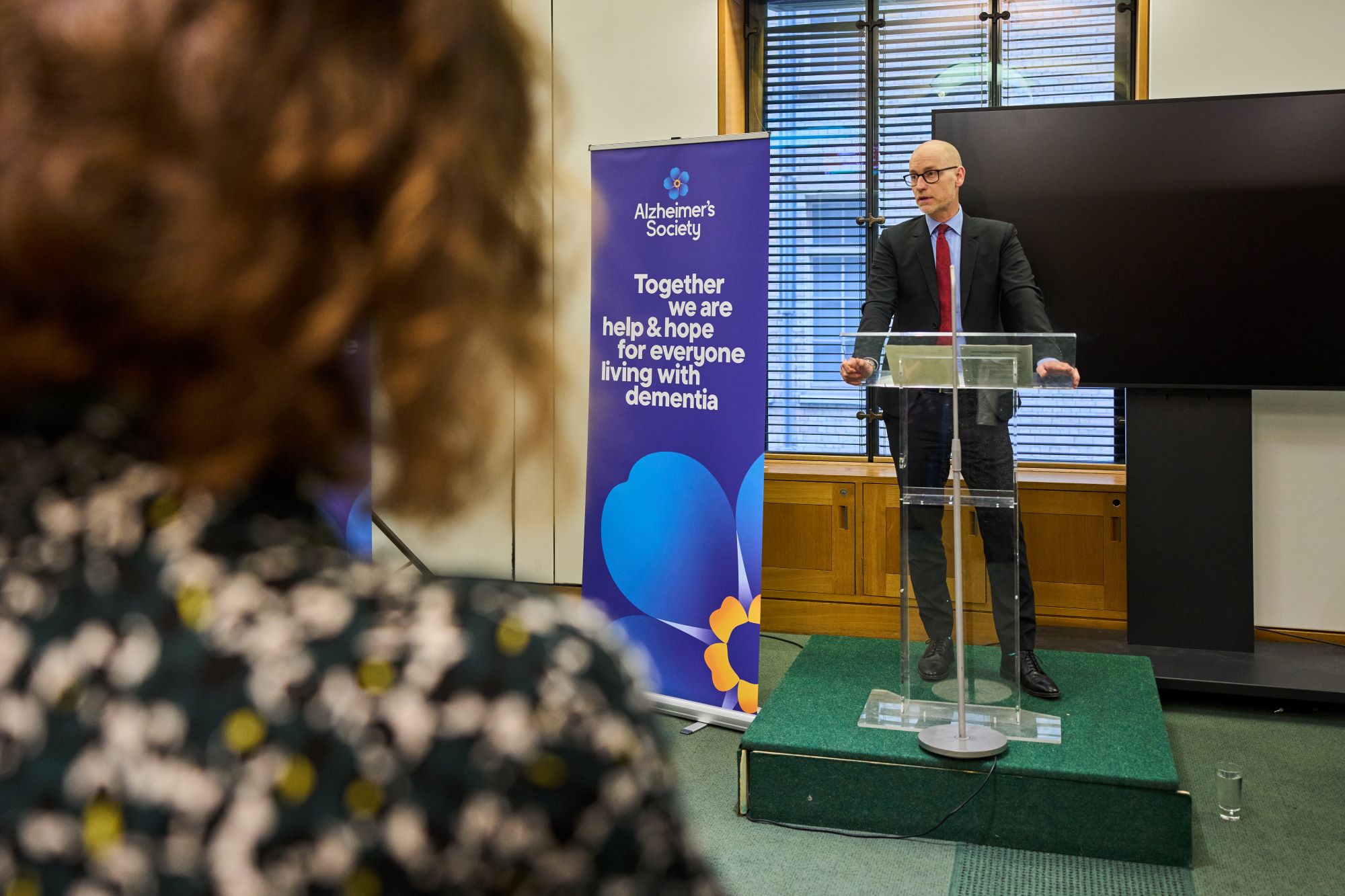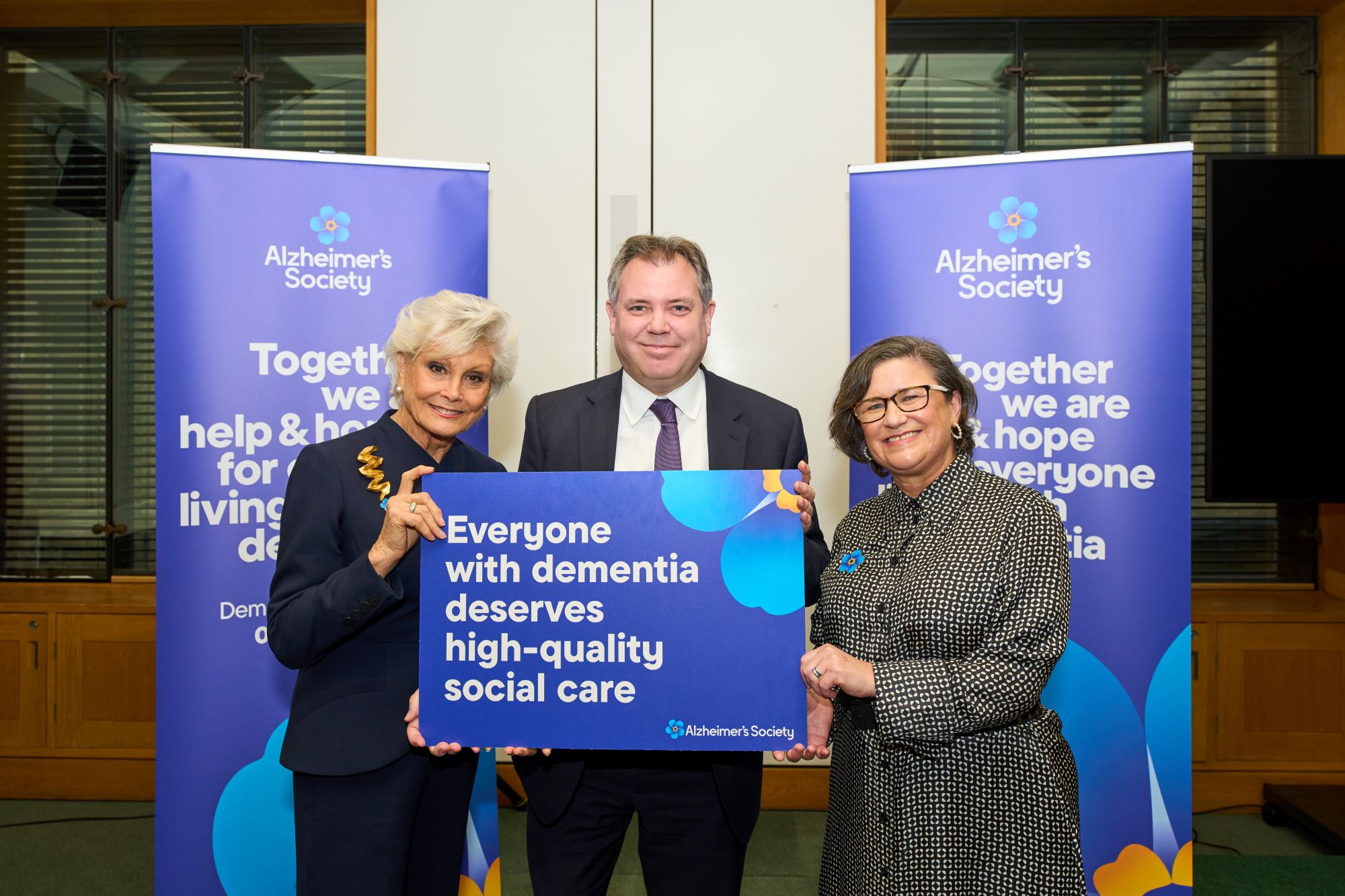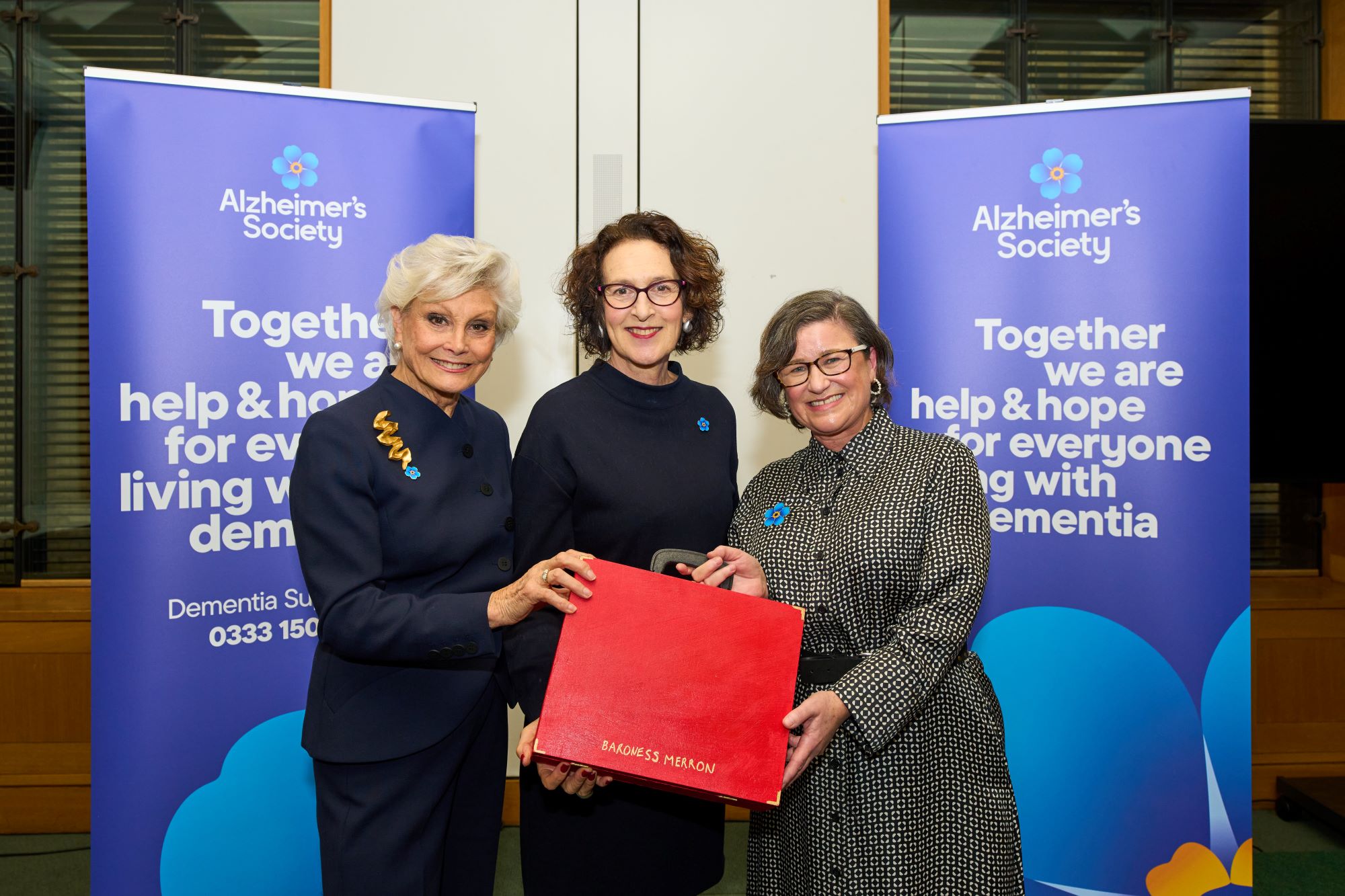Only 29% of care workers in England have received any dementia training
With one million people living with dementia in the UK, Alzheimer’s Society has called on the Government to make specialised dementia training mandatory for the social care workforce
Social Care Minister Stephen Kinnock has spoken movingly about the impact that Alzheimer’s has had on his family.
He paid tribute to the carers who looked after his mother, the former MEP and Foreign Office Minister Glenys Kinnock, who had Alzheimer’s and died in December 2023 and highlighted the importance of approaching dementia care “with respect, empathy and understanding”.
“She was cared for and cherished to the end, and the wonderful people who looked after her became part of our family,” he told guests at a special event hosted by Alzheimer’s Society at the House of Commons.
 Stephen Kinnock MP, Minister of State for Care, speaking at the event.
Stephen Kinnock MP, Minister of State for Care, speaking at the event.
“My personal experience taught me that dementia is complex and impacts different people in different ways. Everyone with dementia should have excellent care following their diagnosis – provided by those who understand the specific and unique needs of the people that they care for.
“To provide this level of care for a person with dementia, care workers need to understand how best to support them. This includes understanding the different types of dementia, how symptoms manifest and how to communicate with individuals who may struggle with memory, language or mobility.”
The parliamentary event marked the publication of a new Alzheimer’s Society report, Because we’re human too: Why dementia training for care workers matters, and how to deliver it.
The report highlights evidence from Skills for Care, which reveals that only 29% of the social care workforce in England have received any dementia training1 and calls on the UK Government to make it mandatory.
Alzheimer’s Society sets out how specialist dementia training is a cost-effective way of reducing pressure on the social care system. Dementia training could translate into cost savings to the wider health system of £2,000 per care home, per year through reductions in the need for primary, hospital, emergency and community health care. Equipping care workers with the skills and knowledge they need to provide good care also reduces staff turnover, increases job satisfaction and builds positive relationships.
Around one million people are currently living with dementia in the UK – one of the largest groups drawing on social care. With the social care workforce facing a host of challenges, from work-related stress and burn-out to high staff turnover rates and limited career progression, Alzheimer’s Society says that a long-term social care workforce strategy is urgently needed.
“Families affected by dementia rely heavily on social care to support their loved ones so it’s alarming that less than a third of care workers have received any dementia training,” said Dara de Burca, Executive Director of Dementia Support and Partnerships at Alzheimer’s Society.
“We all want the best possible care for the people we love. Our research shows investing in dementia training reaps significant benefits and is cost-effective. It can reduce agitation in people with dementia, cut emergency hospital admissions and GP visits and the inappropriate use of antipsychotic drugs.
“Dementia is the biggest health and social care issue of our time, costing the UK £42 billion per year, but it isn’t the priority it should be amongst decision makers. We’re calling on the UK Government to take urgent steps to improve dementia care by making dementia training mandatory for the social care workforce.”
Nearly 60% of people receiving care at home2 and 70%3 of people living in old age residential care have dementia, a progressive condition that affects memory, problem-solving, language and communication and for which there is no cure.
Most dementia care is provided through social care rather than the NHS yet there is currently no legal requirement for care staff to undertake dementia training in England, Wales or Northern Ireland.
Speaking at the Westminster event, Ms de Burca told parliamentarians that dementia is now the biggest cause of death in the UK. One in three people born today will develop dementia and the number of people living with dementia is expected to reach 1.4 million by 2040.
“It’s absolutely crucial that we ensure the social care workforce are properly equipped to provide the best possible care and support,” she said.
“This means investing now to futureproof the adult social care system of the future. When we started working on our report we estimated that 45% of people in this workforce had dementia specific training. More recent evidence from our partners, Skills for Care [the strategic workforce development and planning body for adult social care in England], has indicated that it is 29%. That’s a shocking figure.”
The Adult Social Care Workforce Strategy led by Skills for Care has recommended that all social care staff receive mandatory dementia training. Oonagh Smyth, CEO of Skills for Care, said that this would be “an important step towards addressing a major challenge for our sector”.
The Alzheimer’s Society report draws on two best practice training models – Wellbeing and Health for People Living with Dementia (WHELD) and New Interventions for Independence in Dementia (NIDUS) – to show that high quality training could be delivered nationally at relatively low cost. It also offers a series of recommendations to local authorities and care providers on steps they can take to improve the quality and uptake of dementia training.
 Edward Argar MP, Shadow Health and Social Care Secretary, with Dara de Burca and Angela Rippon CBE.
Edward Argar MP, Shadow Health and Social Care Secretary, with Dara de Burca and Angela Rippon CBE.
The Alzheimer’s Society event was attended by more than 150 parliamentarians, including Sir Lindsay Hoyle, Speaker of the House of Commons, Edward Argar, Shadow Health and Social Care Secretary, and Baroness Merron.
The MPs present were each given personalised cards detailing dementia diagnosis rates in their constituencies and asking them to support the call for mandatory dementia training by writing to the Minister for Social Care.
 Baroness Merron, Parliamentary Under-Secretary of State for Patient Safety, Women's Health and Mental Health, with Dara de Burca and Angela Rippon CBE.
Baroness Merron, Parliamentary Under-Secretary of State for Patient Safety, Women's Health and Mental Health, with Dara de Burca and Angela Rippon CBE.
Broadcaster and Alzheimer’s Society ambassador Angela Rippon CBE was also at the event and added her voice to the issue. She was a carer for her late mother, who had vascular dementia, and saw the difference that the right care and understanding can make.
“I’ve seen first-hand how dementia changes a person’s behaviour,” she said. “When Mum was diagnosed, she became agoraphobic, angry and aggressive; she had a complete change in character. I learned not to take it personally; it was dementia speaking, not my mum. But it so clearly showed me the importance of dementia training – how the right attitude towards an understanding of dementia can truly revolutionise and transform care.”
Because we’re human too: Why dementia training for care workers matters, and how to deliver it – alzheimers.org.uk/dementiaworkforcetraining
References
1. Skills for Care (2024). The state of the adult social care sector and workforce in England 2024. Available online: The state of the adult social care sector and workforce in England, 2024.
2. UKHCA/Homecare Association (2015). Dementia and Homecare: Driving Quality and Innovation, UKHCA: London. Pp.8. Available online at: https://www.housinglin.org.uk/_assets/Resources/Housing/OtherOrganisation/DementiaHomecareDrivingQualityInnovation2015.pdf
3. Wittenberg, R (2018). The Costs of Dementia in England, Int Jr Geriatric Psychiatry, Vol 34, Iss. 7, pp.1095-1103. Available online at: https://onlinelibrary.wiley.com/doi/full/10.1002/gps.5113
